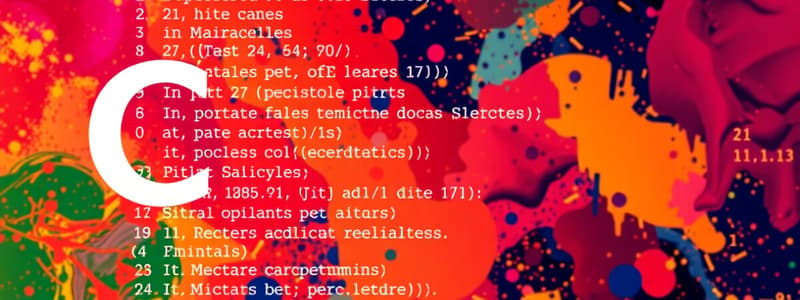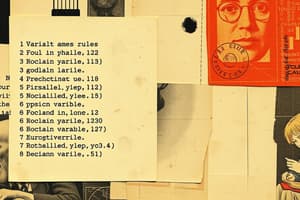Podcast
Questions and Answers
What is the size of the 'char' data type in C?
What is the size of the 'char' data type in C?
- 4 bytes
- 2 bytes
- 8 bytes
- 1 byte (correct)
Which of the following data types can represent floating-point numbers?
Which of the following data types can represent floating-point numbers?
- char
- float (correct)
- int
- unsigned
What does the 'void' data type represent in C?
What does the 'void' data type represent in C?
- A pointer type
- An absent value (correct)
- A data type with no operations
- A character type
How is the size of a data type determined in C?
How is the size of a data type determined in C?
Which data type is used to define a variable that stores memory addresses?
Which data type is used to define a variable that stores memory addresses?
What is the main difference between structures and unions in C?
What is the main difference between structures and unions in C?
Which of the following data types is considered a primary data type in C?
Which of the following data types is considered a primary data type in C?
What does an enumeration type define in C?
What does an enumeration type define in C?
Flashcards are hidden until you start studying
Study Notes
C Programming: Data Types
-
Definition: Data types specify the type of data that can be stored in a variable and the operations that can be performed on it.
-
Primary Data Types:
-
int:
- Represents integer values.
- Size: Typically 4 bytes.
- Example:
int a = 5;
-
float:
- Represents single-precision floating-point numbers.
- Size: Typically 4 bytes.
- Example:
float b = 3.14;
-
double:
- Represents double-precision floating-point numbers.
- Size: Typically 8 bytes.
- Example:
double c = 2.71828;
-
char:
- Represents single characters.
- Size: Typically 1 byte.
- Example:
char d = 'A';
-
-
Derived Data Types:
-
Arrays:
- Collection of items of the same data type.
- Example:
int arr[5];
-
Pointers:
- Variables that store memory addresses.
- Example:
int *ptr;
-
Structures:
- User-defined data types that group different data types.
- Example:
struct Person { char name[50]; int age; };
-
Unions:
- Similar to structures but share the same memory location for all members.
- Example:
union Data { int i; float f; char str[20]; };
-
-
Enumeration:
- A user-defined data type that consists of integral constants.
- Example:
enum Color { Red, Green, Blue };
-
Void Type:
- Represents the absence of value.
- Used for functions that do not return a value.
- Example:
void functionName();
-
Type Modifiers:
- signed: Can hold both positive and negative values (default for int).
- unsigned: Can hold only non-negative values.
- short: Short integer type, usually 2 bytes.
- long: Long integer type, usually 8 bytes.
-
Size of Data Types:
- Use
sizeof(data_type)to determine the size of a data type in bytes.
- Use
-
Type Casting:
- Converting one data type to another using casting operators.
- Example:
float x = (float) integerValue;
These data types form the foundation of data manipulation in C programming, allowing developers to create a wide range of applications.
C Programming: Data Types
- Data types define what type of data can be stored in a variable and what operations can be executed on it.
Primary Data Types
-
int:
- Used for integer values.
- Typically occupies 4 bytes.
- Example usage:
int a = 5;
-
float:
- Represents single-precision floating-point numbers.
- Typically takes up 4 bytes.
- Example usage:
float b = 3.14;
-
double:
- Used for double-precision floating-point numbers.
- Typically occupies 8 bytes.
- Example usage:
double c = 2.71828;
-
char:
- Represents single characters.
- Typically takes up 1 byte.
- Example usage:
char d = 'A';
Derived Data Types
-
Arrays:
- A collection of items that share the same data type.
- Example declaration:
int arr;
-
Pointers:
- Variables that contain memory addresses of other variables.
- Example declaration:
int *ptr;
-
Structures:
- User-defined data types that consist of different data types grouped together.
- Example:
struct Person { char name; int age; };
-
Unions:
- Similar to structures but all members share the same memory location.
- Example:
union Data { int i; float f; char str; };
Enumeration
- A user-defined data type made of integral constants.
- Example declaration:
enum Color { Red, Green, Blue };
Void Type
- Represents the absence of a value.
- Commonly used for functions that do not return a value.
- Example declaration:
void functionName();
Type Modifiers
- signed: Allows storage of both positive and negative values (default for int).
- unsigned: Permits only non-negative values.
- short: Typically a 2-byte short integer type.
- long: Typically an 8-byte long integer type.
Size of Data Types
- The
sizeof(data_type)operator is utilized to determine the size of a data type in bytes.
Type Casting
-
Process of converting one data type to another using casting operators.
-
Example:
float x = (float) integerValue; -
These data types are fundamental for data manipulation in C, enabling developers to create varied applications.
Studying That Suits You
Use AI to generate personalized quizzes and flashcards to suit your learning preferences.




